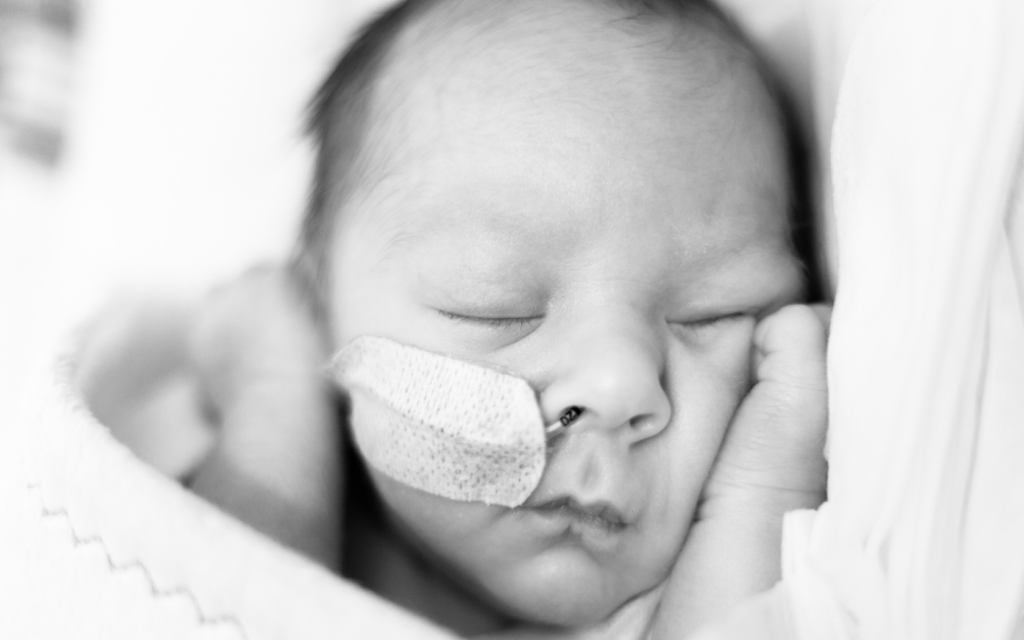Infant seizures are every parent’s nightmare. Their beloved baby has finally made an entrance after nine long months of waiting…only to start seizing and convulsing out of the blue. No parent wants to have to see a newborn seizures attorney (more commonly called a birth injury lawyer). But it happens more than you might think.
Seizures affect about one out of every two infants. They can be short and subtle, or long and dramatic. But they’re almost always unexpected. Sometimes, they’re benign – like inherited clonic seizures that the baby will grow out of. But many times, infant seizures happen because of medical malpractice and have devastating, long-term effects.
What Are Neonatal Seizures? How Does Brain Injury Factor in?
Newborn seizures (AKA neonatal seizures) happen when a baby suffers from repetitive involuntary movements or stiffening of certain muscle groups. These events can happen for a few seconds or a few minutes, and several or many times per day.
What causes neonatal seizures? Abnormal electrical transmissions in a baby’s brain. These prevent the brain from functioning in a normal way. Seizures in infants can be caused by birth-related brain damage for example, which deprives the brain of oxygen. Because brain injury or scarring can induce aberrant electrical activity, infants with cerebral palsy are at a higher risk for seizures.
Of course, seizures can happen to patients of any age. But newborn seizures can be especially devastating. They often cause life-long complications and even death in otherwise healthy infants.

Types Of Newborn Seizures
These are some of the most common types of newborn seizures:
- Subtle Seizures. Subtle seizures are the most common type of neonatal seizures. Symptoms include chewing or “mouthing”, pedaling legs, pauses in breathing, and fluttering eyes.
- Myoclonic seizures. In these types of neonatal seizures, muscle groups contract. The contractions can happen just once, or many times, repeatedly. They can be fast or slow, depending on the muscles involved.
- Focal clonic seizures. This is one form of focal seizure. It’s when the baby’s arms, legs, trunk, or facial muscles move in a rhythmic, repetitive way. The movements are almost always slow.
- Focal tonic seizures. The baby’s eyes move abnormally, or his body takes on an abnormal posture. His arms or legs may become stiff. This type of seizure usually lasts less than 20 seconds.
- Febrile seizures. These neonatal seizures occur when an infant has a high fever, which may be the result of an infection. The baby may twitch or jerk her legs, roll her eyes, and lose consciousness.
- Atonic seizures. When babies suffer neonatal seizures of this type, they go limp, because of a sudden loss of muscle control.
- Epileptic spasms. These are rare, but they can have serious long-term consequences. They involve muscle spasms in the limbs, neck, or torso.
Another form of seizure is infantile spasms, but they’re not neonatal. These spasms can happen later on, usually at around 3-12 months of age. Prolonged and untreated seizures can become a very serious problem. This brings us to negligence, and what happens when doctors fail to prevent seizures.
Negligence That Causes Newborn Seizures
Sometimes, neonatal seizures are hereditary. Other times, they’re the result of trauma during birth. When birth trauma is preventable, a medical mistake or medical malpractice is often to blame.
Many infant seizures are caused by medical errors. If a doctor or other health care practitioner fails to monitor or respond appropriately to specific scenarios that happen during delivery, they may be considered negligent.
During pregnancy, labor, and delivery, a delivery medical team should keep an eye on the mother and baby to spot any potential issues. Doctors, nurses, and other medical staff may be negligent, resulting in circumstances that may end in infant seizures.
Here are some examples of negligence that can lead to infant seizures:
- When a mother’s condition is not properly diagnosed and treated.
- Failure to offer adequate prenatal care.
- Improper labor and delivery treatments.
- Failure to recognize a macrosomic newborn.
- Failure to diagnose preterm labor promptly.
- Failure to quickly treat preterm labor.
- Failure to properly respond to bleeding on time.
- Failure to treat a mother’s high blood pressure (preeclampsia).
- Failure to remove blood clots quickly and correctly.
- Negligent labor and delivery management.
- Failure to quickly and correctly deliver a baby in distress.
- Failure to resuscitate a newborn correctly.
- Failure to take action in response to symptoms of fetal distress, like a deceleration in fetal heart rate.
- Using a vacuum extractor or forceps during delivery incorrectly (this can be dangerous).
- Inadequate management of a pre-term or late-term pregnancy.
Other concerns in newborns with seizures linked to brain damage include cerebral palsy, mental retardation, and other neurological issues. A thorough examination of your child’s medical records can reveal birth injuries or another source of damage, and whether the delivery team’s activities contributed to the seizures.
Need A Newborn Seizures Lawyer?
Our birth injury attorneys and medical consultants have investigated medical errors and birth injury malpractice before, and they have access to the type of skilled medical professionals needed to analyze intricate birth injury cases.
For a free consultation with an expert lawyer, contact Hampton & King immediately. We’ll utilize our expertise to help you hold doctors accountable for carelessness, to get the compensation you need to care for your newborn.
Call us at (713) 658-0231 or fill out our online form for a free consultation.
The Most Common Causes Of Newborn Seizures
The following are the most common causes of newborn seizures:
- Cerebral Palsy. When a baby’s brain becomes damaged during pregnancy or birth, she can develop a movement disorder called cerebral palsy. The usual cause of this damage is oxygen deprivation. One of the main symptoms of cerebral palsy is seizures.
- Head and Brain Injuries During Birth. During a difficult birth, a baby’s brain may be deprived of oxygen. This can lead to brain damage, which causes seizures. Also, doctors might injure the baby’s head with vacuum extractors or obstetrical forceps as they attempt to deliver him. Serious injuries like skull fractures, brain bleeds, and hydrocephalus (a cerebrospinal fluid leak) can all cause newborn seizures.
- Infections. Many different types of infections can cause seizures in newborns. Most are passed from the mother to the baby during pregnancy. Certain infections, such as Group B strep, are notorious for causing newborn seizures. Mothers should be screened in late pregnancy to prevent the passing of infections.
- Oxygen deprivation. Whether during or before birth, oxygen deprivation can cause a brain injury called hypoxic-ischemic encephalopathy (HIE). This typically happens because of abnormally long labor, umbilical cord compression, or placental abruption, which is when the placenta gets separated from the womb (uterus).
Infant Seizures As The Result Of Medical Malpractice
Births are unpredictable. Some are complication-free. Others involve medical emergencies like cord compression, fetal distress, and prolonged labor. No one can see an emergency coming, but doctors must be prepared to deal with it when it occurs.
When medical staff fail to act according to the “standard of care” (what a well-trained professional should do in a certain situation), newborn seizures can be the direct result of medical malpractice.
For example, a doctor might fail to screen or treat a mother for infection. The infection is then passed on to the baby, causing intense fever and febrile seizures. Or, staff may use forceps incorrectly. Sometimes, this causes permanent brain damage, which leads to severe seizures. (Learn more about when to contact a birth injury attorney.)

When To Contact A Birth Injury Lawyer
Newborn seizures are one of the first signs of birth injury. If your baby suffers from seizures that started shortly after birth, you may have a medical malpractice case on your hands. Don’t wait to take action!
Contact Hampton & King today for a free consultation with an experienced birth injury attorney. We’ll use our expertise to hold doctors accountable for negligence and ensure you get the compensation you need to care for your infant.
Newborn Seizures Law & Birth Injury Attorney FAQs
Is it normal for newborns to have seizures?
Neonatal seizures occur at an estimated rate of 1 in every 200 to 500 babies, so it’s relatively rare. Generally speaking, infant seizures occur in the first day or two, usually within the first week after birth. Birth injuries can be the cause, but aren’t always.
What’s the most likely cause of a seizure in a newborn?
Out of all birth injuries, hypoxic ischaemic encephalopathy (HIE) is the most common cause of neonatal seizures. If your baby has HIE because of medical malpractice, you can file a lawsuit against the negligent medical professional or hospital. That said, in preterm babies, intracranial hemorrhage is the most common cause.
Do newborn seizures cause brain damage?
Newborn seizures can do a lot of damage to an infant’s brain. They really have to be treated right away. Because these seizures can kill brain cells and injure nerve cells. The damage can be severe, and the longer the seizure, the more damage it does to the infant’s brain.
Can I sue for a newborn injury?
It certainly is possible. If your baby gets injured because of a doctor or nurse’s negligence, you may have a case. And if you do, you have the right to sue the hospital or the doctor responsible for malpractice. If that sounds like your situation, contact a birth injury lawyer right away. (So you don’t run out of time.) Your lawyer will be able to determine whether or not you have a case, and what steps to take.
Can I sue for HIE?
If you believe your baby’s birth injury could have been prevented by a competent doctor, you may want to contact our birth injury attorneys to seek compensation via a birth injury lawsuit. This type of medical malpractice lawsuit focuses on the pregnancy and birth period and the injury that comes about during it.




